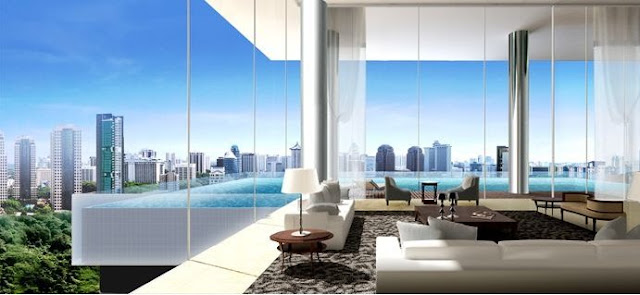Big-ticket homes to feel harsher tax heat
Non owner-occupied premises will see the highest rates in property taxes
The Business Times - February 26, 2013
OWNERS of high-end homes will face higher taxes, with investment properties bearing the brunt of the increase.
In a shift towards a more progressive tax structure, the tax band for owner-occupied homes was expanded from the current 0 per cent, 4 per cent, and 6 per cent tax rates, to encompass a a wider range of rates, ranging from 0 per cent to 16 per cent.
Under the new tiered rates, an owner-occupied landed property in the central area with an annual value (AV) - estimated annual rent - of $150,000 will see an increase in property tax of $5,120 per year.
Marginal property taxes for residential properties that are not owner-occupied and, therefore, owned for investment purposes, will be increased to 12 per cent to 20 per cent, from the current 10 per cent.
At the high end, a landed property in the central area with AV of $150,000 will see an increase in property tax of $9,000 a year (60 per cent increase). Suburban condominiums, on the other hand, will see a smaller increase of about $100 to $300 per year.
SLP International's head of research Nicholas Mak noted that while the percentage increase in taxes specific to luxury homes appears big, the quantum increase is "marginal" compared with the rental income received.
"Most high-end property buyers who can afford luxury properties will likely take the increase in property tax in their stride," he said.
Petra Blazkova, head of CBRE Research, Singapore and South-east Asia, said: "The graduated property tax on luxury properties... may put pressure on the holding cost of investment properties held by developers and investors. At an asset level we are likely to see yields compressing, even though only marginally."
Savills Singapore research head Alan Cheong too said he does not expect the new rates to impact rents significantly, given that rents are more dependent on demand and supply.
"However, taken in circumspect, it appears that with the higher marginal tax rates added on to personal taxes, owning a high-end real estate here for investment is becoming less of an attractive proposition than investing in one in a developed economy where taxes are higher. This will encourage more to take their capital overseas," said Mr Cheong.
Another possible effect is that property owners may switch to buying commercial properties given that property tax rates for non-residential properties remains unchanged at 10 per cent, said KPMG tax partner Leonard Ong.
"This will drive up the cost of commercial properties and overall business costs," said Mr Ong.
"We do not think this revision in tax rates will have any significant impact on the residential market. Some investors may choose mass market homes over the high-end segment as a result of the potential tax savings but we do not think there will be any general shift in demand," said Jones Lang LaSalle's head of research, South-east Asia, Chua Yang Liang.
The Budget is clearly about anchoring Singaporeans at the core, said Ho Mui Peng, tax partner with PricewaterhouseCoopers Services.
"The widening income disparity is managed somewhat with loading property tax increases, to the high-end property owners and increase in additional registration fees for high-end cars," she said.
Indeed, the more aggressive wealth tax means that the majority of owner-occupied residential properties will enjoy lower tax rates.
Specifically, some 950,000 owner-occupied properties will enjoy tax savings, with the widening of the 0 per cent property tax rate band from the first $6,000 of annual value, to $8,000. This means that homes with annual values of $12,000 (such as a five-room HDB flat) will experience tax savings of $80 (33 per cent of their current property tax bill).
All one- and two-bedroom HDB flats will continue to pay no property tax.
The revision in tax rates is a redistribution of tax liability from the cheaper asset class to the more expensive asset class, said Lee Liat Yeang, real estate partner at Rodyk & Davidson LLP.
"As long as the property is for owner-occupation, with AV below $55,000, you're not affected," he said. "With an AV of more than $50,000, your rental has to be pretty high, at least $7,000 per month... So it's a redistribution of tax liability and burden from the poorer class to the wealthy class."
The new tax structure for residential properties will be phased in over two years starting from Jan 1, 2014. The revised rates will take full effect from Jan 1, 2015.
Separately, the concession which provides tax refunds on vacant properties has been abolished, and will take effect from Jan 1, 2014.
Savills's Mr Cheong said: "This may have serious implications on the rental market in that it could force individuals or companies, to (dispose of) their vacant units onto the market at a time when rental budgets are constrained and the net number of employment passes issued have not been growing."
Added SLP's Mr Mak: "The impact is greater on owners who are holding on to properties for generating rental income, namely, real estate investment trusts. But the impact on the residential property market is minimal."
Martin Koh | 86666 944 | R020968Z
Sherry Tang | 9844 4400 | R020241C
Senior Sales Director
DTZ Property Network Pte Ltd (L3007960A)
Email: marshe_inc@yahoo.com.sg



